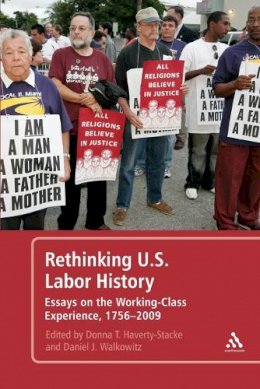15%OFF

Stock image for illustration purposes only - book cover, edition or condition may vary.
Rethinking U.S. Labor History: Essays on the Working-Class Experience, 1756-2009
D Haverty-Stacke
€ 49.99
€ 42.28
FREE Delivery in Ireland
Description for Rethinking U.S. Labor History: Essays on the Working-Class Experience, 1756-2009
Paperback. Provides a reassessment of the growth and the various directions in US labor history. This title focuses on: the relationship of class and culture; the link between worker's experience and the changing political economy; the role that gender and race have played in America's labor history; and, the transnational turn. Editor(s): Haverty-Stacke, Donna T.; Walkowitz, Daniel J. Num Pages: 400 pages, black & white tables. BIC Classification: 1KBB; 3JF; 3JH; 3JJ; 3JMC; HBJK; HBLL; HBLW; HBLX; HBTB. Category: (UP) Postgraduate, Research & Scholarly; (UU) Undergraduate. Dimension: 227 x 152 x 21. Weight in Grams: 548.
"Rethinking U.S. Labor History" provides a reassessment of the recent growth and new directions in U.S. labor history. Labor History has recently undergone something of a renaissance that has yet to be documented. The book chronicles this rejuvenation with contributions from new scholars as well as established names. "Rethinking U.S. Labor History" focuses particularly on those issues of pressing interest for today's labor historians: the relationship of class and culture; the link between worker's experience and the changing political economy; the role that gender and race have played in America's labor history; and finally, the transnational turn.
"Rethinking U.S. Labor History" provides a reassessment of the recent growth and new directions in U.S. labor history. Labor History has recently undergone something of a renaissance that has yet to be documented. The book chronicles this rejuvenation with contributions from new scholars as well as established names. "Rethinking U.S. Labor History" focuses particularly on those issues of pressing interest for today's labor historians: the relationship of class and culture; the link between worker's experience and the changing political economy; the role that gender and race have played in America's labor history; and finally, the transnational turn.
Product Details
Publisher
Continuum Publishing Corporation
Number of pages
400
Format
Paperback
Publication date
2010
Condition
New
Number of Pages
352
Place of Publication
New York, United States
ISBN
9781441145758
SKU
V9781441145758
Shipping Time
Usually ships in 5 to 9 working days
Ref
99-1
About D Haverty-Stacke
Donna Haverty-Stacke is Assistant Professor of History at Hunter College, CUNY. She is the author of America's Forgotten Holiday: May Day and Nationalism, 1867-1960 (forthcoming from NYU Press). Daniel Walkowitz is Director of Experiential Education, Acting Director of Metropolitan Studies, Professor of Social and Cultural Analysis, and Professor of History at New York University. He is an American social historian who specializes in labor, urban, and working-class history. Over the past thirty years, Walkowitz has authored over thirty articles and co-edited or authored six books. His most recent books are Working With Class: Social Workers and the Politics of Middle-Class Identity (North Carolina, 1999), and, co-edited with Lisa Maya Knauer, Memory and the Impact of Political Transformation in Public Spaces (Duke, 2004). He is also General Editor for the ten-volume Social History of the United States, forthcoming from ABC-Clio.
Reviews for Rethinking U.S. Labor History: Essays on the Working-Class Experience, 1756-2009
"Drawing on new as well as seasoned talents to probe the outer limits of a rapidly evolving field, Rethinking U.S. Labor History will undoubtedly take its place as a valuable marker of the discipline's own history."
Leon Fink, University of Illinois at Chicago "Much the way Walkowitz and Michael Frisch did a quarter century ago with Working-Class America, this superb new volume of essays illustrates the state of the field while setting the agenda for the next generation of U.S. labor history. While attentive to the intersections of class and culture that have animated much recent scholarship, this volume also offers a renewed focus on the structural factors that have impinged on workers' lives. Some of the most interesting essays explore how aspects of working-class culture and consciousness offered resistance to the entreaties of organizers, militants, and strikers, matters historians have too often ignored. Yet others consider the past in light of the new demographics and sectoral dimensions of today's labor force, while emphasizing the power of the state and transnational links to shape working-class lives. Collectively, Walkowitz's and Haverty-Stacke's contributors insist that U.S. labor historians rethink for the politics of a new century the shop-worn definitions of our essential subjects: work and the worker. If "labor" has a future in our neo-liberal era—as a material practice, a form of social organization, and a subject fit for close study—clues to its dynamics will be found in these pages."
Alex Lichtenstein, Florida International University, USA
Leon Fink, University of Illinois at Chicago "Much the way Walkowitz and Michael Frisch did a quarter century ago with Working-Class America, this superb new volume of essays illustrates the state of the field while setting the agenda for the next generation of U.S. labor history. While attentive to the intersections of class and culture that have animated much recent scholarship, this volume also offers a renewed focus on the structural factors that have impinged on workers' lives. Some of the most interesting essays explore how aspects of working-class culture and consciousness offered resistance to the entreaties of organizers, militants, and strikers, matters historians have too often ignored. Yet others consider the past in light of the new demographics and sectoral dimensions of today's labor force, while emphasizing the power of the state and transnational links to shape working-class lives. Collectively, Walkowitz's and Haverty-Stacke's contributors insist that U.S. labor historians rethink for the politics of a new century the shop-worn definitions of our essential subjects: work and the worker. If "labor" has a future in our neo-liberal era—as a material practice, a form of social organization, and a subject fit for close study—clues to its dynamics will be found in these pages."
Alex Lichtenstein, Florida International University, USA
